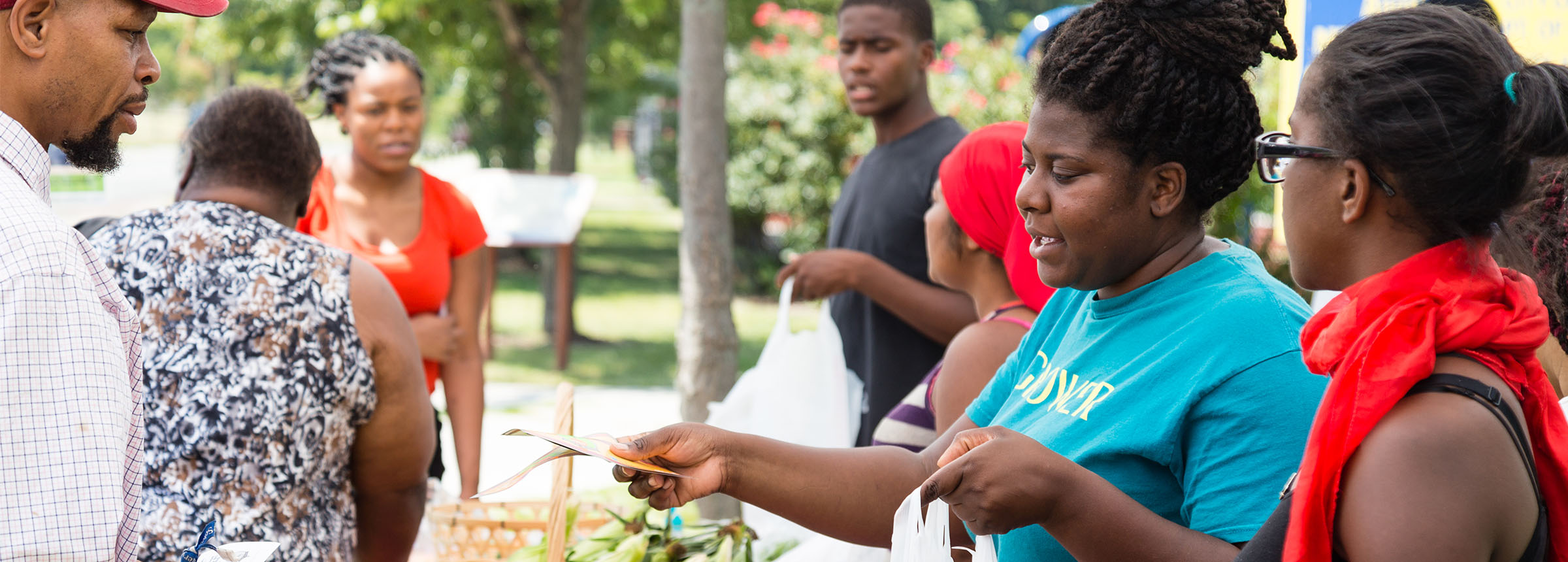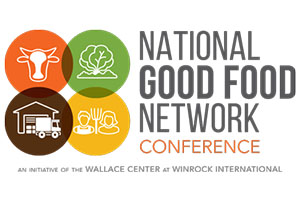
Market Channels

Grocery and corner stores: Three from-the-field strategies activating retailers to grow equitable, regional food systems
Wednesday March 11th, 2:15-3:45
Billions of food dollars are spent every year at grocery stores in the United States. Yet many smaller independent stores, which are often the sole outposts of healthy food in urban and rural communities, struggle in an era of Wal-Mart and Amazon. Food systems advocates are increasingly partnering with traditional grocers on efforts that increase local food sourcing and healthy food access, while supporting the bottom line of participating stores. This interactive session will spotlight three interlocking strategies from the field including: SNAP produce incentives to boost the purchasing power of low-income families; financing and technical assistance geared to healthy food retailers and farmers; and value chain coordination to increase local sourcing. Stories from the field will be followed by break-out sessions where participants can map out how to incorporate such grocery partnerships in their own communities.
Speakers: Noah Fulmer, Director of National Partnerships, Fair Food Network, Denise Miller, Executive Director, New Mexico Farmers’ Marketing Association, Amy Nelms, Food Access Manager, LiveWell Colorado, Beverly Grant, Farmer, Seeds of Power Unity Farm and Founder, Mo’betta Green Market Place, Jean Chorazyczewski Program Director, Fair Food Network
CSA 2.0: Adaptations for reaching new markets and opportunities
Wednesday March 11th, 4-5:30pm
Community Supported Agriculture programs have fostered direct connections between producers and consumers since the 1980s. 40 years later, adaptations to the CSA model are exploring how to retain short and well-connected supply chains while also incorporating more consumers. This session will explore three innovative CSA models– in rural convenience stores, as an employee benefit, and as institutional sales tool– that have added to the original model. Participants will have an opportunity to ask detailed questions about implementation of these programs and consider their unique considerations, investments, and drawbacks.
Speakers: Hugo Moggollon, Executive Director, FRESHFARM, Dalila Boclin, Director of Programs, FRESHFARM, Tim Woods, Extension Professor, University of Kentucky, Diane Smith, Regional Nutrition Specialist, WSU Skagit County Extension
Under the Farm to Institution Hood: Successes, Lessons Learned, and Strategies
Thursday March 12th, 10:30-12
Join us for this dynamic and detailed look at the farm to institution landscape and the proven strategies that can be implemented across the supply chain. Farm to Institution New England (FINE) will start the session with an overview of the fundamentals and impact of farm to institution activity in New England and beyond. This session will introduce three specific strategies that will be explored in more detail through real world case studies. Our first case study comes from the University of Kentucky who will share strategies for leveraging institutional contracts to increase local procurement. Next we will hear from Farm to Institution New York State (FINYS) who will discuss New York’s recent “30% NYS Initiative,” which increases state reimbursements to K-12 schools for local food purchases. We will then hear from Local Food Connection and CommonWealth Kitchen about their experiences connecting producers and institutions through forward contracts and seasonal agreements. Finally, we will transition to breakout groups to discuss how to implement these strategies in your own work.
Speakers: Hannah Leighton, Research and Evaluation Manager, Farm to Institution New England, Ashton Potter Wright, Director, Local Food & Agricultural Development / City of Lexington, Sarah Fritschner, Local Food Coordinator, Custom Food Solutions, Alice Chalmers, Founder, Local Food Connection, Jen Faigel, Director, CommonWealth Kitchen, Stephanie Hsu, Program Manager, Farm to Institution New York State/American Farmland Trust
Values-Based Procurement Policies: Opportunities and Challenges
Thursday March 12th, 2-3:30
Increasingly, the over 300 food policy councils across North America are making recommendations to support values-based procurement policy, where municipal and other large scale purchases are required or encouraged to make procurement decisions based on consumer values. This session will discuss two of these values-based procurement policies – the Good Food Purchasing Program and per meal incentives for Farm to School. The Good Food Purchasing Program provides a metric based, flexible framework that encourages large institutions to direct their buying power toward five core values: local economies, environmental sustainability, valued workforce, animal welfare and nutrition. Farm to School programs work to enrich connections communities have with fresh, healthy food and local food producers by changing food purchasing and education practices at schools and early care and education settings. Presenters will highlight opportunities created through these programs, as well as challenges with implementation. In particular, speakers will highlight an ongoing example from Austin, TX wherein the municipality is working with an ecosystem of cross-sector partners, including a food hub to fulfill the demands of institutional buyers, yet challenges arise that mirror the complexity of our food system related to cost, availability, lack of transparency, barriers for producers to meet the value-based procurement standards.
Speakers: Becca Jablonski, Assistant Professor and Food Systems Extension Economist, Colorado State University, Alexa Delwiche, Co-Founder, Executive Director, The Center for Good Food Purchasing, Haile Johnston, Co-founder & Chief Development Officer, The Common Market, Elliott Smith, Co-founder, Kitchen Sync Strategies
Navigating Institutional Procurement: Integrating Diverse and Local food Companies into the Equation
Friday March 13th, 10-11:30
CommonWealth Kitchen is on a mission to build the capacity, connections, and collective power of diverse entrepreneurs to create a new food economy grounded in racial, social and economic justice. To accomplish our mission, CWK operates Greater Boston’s only non-profit food business incubator and regional food processing center. A key focus of our work is on helping our diverse member companies secure sales in institutional food service. This approach has the added benefit of creating a reliable sales channel for our own line of value-added products made largely from regional farm surplus. Through this work, CWK and our members have products on the menus at Harvard, MIT, Boston College, Boston Children’s Hospital, Brigham and Women’s Hospital, and Boston Public Schools, among others. In this session, we’ll share some of the hard-earned lessons of navigating the complex, confusing world of institutional food service. We’ll share our experience working with independent operators vs. 3rd party vendors, developing custom products, sharing risk and managing cash flow with our member businesses, sorting out distribution channels, integrating products into menu cycles, etc. No sugarcoating- just our honest experience.
Speakers: Jen Faigel, Executive Director, CommonWealth Kitchen, Ismail Samad, Director of Manufacturing, CommonWealth Kitchen
